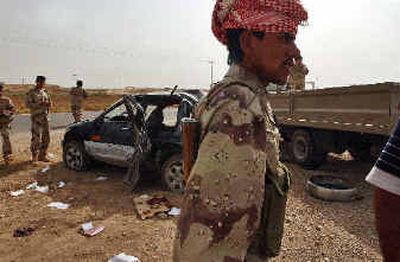Insurgents kill unarmed Iraqi troops

BAGHDAD, Iraq – In the deadliest ambush yet on Iraq’s armed forces, guerrillas killed dozens of unarmed Iraqi soldiers, many apparently forced onto their stomachs and shot execution-style along a remote eastern highway near the Iranian border, Iraqi officials said Sunday.
Estimates of the death toll from Saturday’s ambush ranged from three dozen to 51.
Iraqi officials said gunmen disguised in Iraqi military uniforms stopped the U.S-trained soldiers as they rode home in a convoy of minibuses Saturday evening. The soldiers, who had just completed boot camp in Kirkush and were starting home leave, rolled up to a phony checkpoint just after nightfall, officials said.
The young recruits were pulled off the buses, forced to lie prone in rows of 12, ordered to place their hands on their heads and methodically executed, according to an account by Iraqi police. Some apparently tried to run away.
“Most of them were shot in their backs and the back of their heads,” said Abdul-Hassan Mandali, mayor of the county in which the men were killed.
In an interview with the Arabic satellite channel Al-Arabiya, Diyala’s deputy Gov. Aquil Hamid al-Adili said he believed the ambush was an inside job.
“There was probably collusion among the soldiers or other groups,” he said. “Otherwise, the gunmen would not have gotten the information about the soldiers’ departure from their training camp and that they were unarmed.”
A Web site used by Islamic extremists announced that militants loyal to Jordanian militant Abu Musab al-Zarqawi claimed responsibility for the killings. The message posted by the group calling itself al Qaeda in Iraq claimed that it had killed 48 “apostates” in the attack.
“The mujahedeen killed them all, stole two vehicles and the salaries they had just received from their masters,” said the statement. Its authenticity could not be verified.
On Sunday, an early morning mortar attack on a military base near Baghdad International Airport killed a U.S. State Department officer as he slept.
Ed Seitz, an agent with the State Department’s Bureau of Diplomatic Security, was killed around 5 a.m. at Camp Victory while an unspecified number of other people were wounded in the explosion.
Details of the Iraqi recruits’ killings remained unavailable – and in dispute – Sunday.
Iraqi police officials estimated that as many as 51 soldiers were killed, while U.S. military sources placed the death toll at three dozen.
U.S. military sources said the incident occurred about 60 miles south of Baqubah in neighboring Wasit province, an area patrolled by Polish and Ukrainian troops.
Iraqi officials said the killings occurred roughly 95 miles northeast of Baghdad, in the turbulent province of Diyala. Police in that area, particularly in the provincial capital of Baqubah, have been targets of assassinations, car bombs and drive-by shootings. Eleven police recruits were recently shot dead there while riding in a minibus.
In Saturday’s attack, most of the young recruits wore civilian clothes and were headed to southern Iraq when they were killed. They were identified by their military IDs, said Mandali Police Chief Subhi Beyran.
Villagers in the area called police after hearing gunfire sometime between 6 p.m. and 8 p.m. Saturday.
Iraqi government spokeswoman Maha Malik said witnesses told investigators that insurgents attacked two vehicles with rocket-propelled grenades. The shells of two burned-out minibuses were found at the scene. Witnesses told police that the attackers drove away in one or more buses.
On Sunday, the bodies were driven by truck to an Iraqi national-guard facility in Mandali, where they were placed on long sheets for identification. Onlookers wept as the corpses, their civilian clothing stained with blood, were lined up.
Most of the soldiers came from poor families in the primarily Shiite Muslim cities of Basra, Amara and Nasiriyah. An Iraqi security official said, “It appears that they were ambushed by a large, well-organized force with good intelligence.”
Evidence at the scene suggested that about a dozen soldiers attempted to flee from the militants before they were gunned down.
It was unclear Sunday why the soldiers were unarmed – whether they did not have weapons or because they were not allowed to carry them when they were off duty. Many Iraqi army and national guardsmen are prohibited from carrying weapons because their superiors fear they might fall in insurgents’ hands.
Members of the Iraqi armed forces are frequent targets of insurgents, who see them as collaborators with the U.S.-led occupation. On July 28, a car bomb killed 68 people outside a police recruiting center in Baqubah.
Also Sunday, radical Shiite cleric Muqtada al-Sadr, whose followers began disarming more than a week ago under a fledgling peace agreement, raised doubts about the future of that agreement when he pledged his support for insurgents in Fallujah.
“I am ready to provide a helping hand for you my mujahedeen brothers in Fallujah in our beloved Iraq, for I condemn or denounce all violations and attacks to all Iraqi cities,” he said in a statement. “I am ready to interfere if you wish, so choose your road and I am with you hand in hand, but I hope that your city and all Iraqi cities avoid the war, for the enemy has no mercy.”